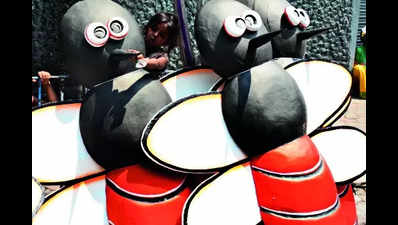
Times News Network Ludhiana: The health department will “train” two million students from schools and colleges to ensure that every Class XII student or graduate is equipped with the knowledge in “detecting larvae and providing first aid to those in need”. Announcing this on Monday, Punjab health and family welfare minister Dr Balbir Singh, who held a review meeting on vector-borne diseases at Ludhiana Civil Hospital, stressed the impact of “community involvement and the participation of nursing students in the Punjab govt’s anti-dengue initiative, which has led to a 70% decrease in dengue cases this year”. Starting next year, the health department will “educate” two million students, including those in senior secondary classes and colleges, in identifying dengue larvae and contributing to community prevention efforts.
“Students will also learn to provide first aid,” the minister said. Discussions are continuing with medical colleges and other nursing institutions to collaborate on training approximately 50,000 medical or nursing students, focusing on the early detection of lifestyle disorders such as hypertension, diabetes, cancer, heart disease and strokes — all of which are classified as non-communicable diseases (NCDs). The minister said early detection of NCDs will help reveal which areas in the state are facing specific health challenges.
Singh expressed the state govt's “commitment under chief minister Bhagwant Singh Mann towards creating a healthier Punjab”. By Jan 2025, the Ludhiana Civil Hospital will be transformed into a state-of-the-art medical facility, offering services comparable to private corporate hospitals. He acknowledged the support of Rajya Sabha member Sanjeev Arora.
He said the aim is to “equip civil hospitals in all districts with essential equipment, medication and facilities needed for patients’ physical and psychological recovery”. Earlier, the minister visited Dayanand Medical College & Hospital (DMC), where he chaired a meeting on the Stop Epilepsy programme in SBS Nagar district and the STEMI Project. During the meeting, doctors from DMCH presented their studies on the Stop Epilepsy initiative.
He encouraged them to expand their research to all 23 districts of Punjab, providing a detailed overview of individuals suffering from epilepsy. The minister also reviewed the progress of the STEMI Project, which aims to improve emergency cardiac care across the state. In the morning, the minister inaugurated the annual athletic meet at Guru Nanak Public School, Sarabha Nagar and distributed prizes to the winners.
Civil Surgeon Dr Pardeep Kumar Mahindra, doctors and officials were present. We also published the following articles recently Vector-borne diseases register sharp decline Jharkhand is witnessing a significant decline in vector-borne diseases this year. Dengue, chikungunya, and malaria cases have all dropped compared to 2023, with malaria experiencing a 22% reduction.
This positive trend is attributed to successful public awareness campaigns, improved sanitation, and proactive vector control measures implemented by the state health department. Nursing students death: College officials under scrutiny A fourth-year nursing student, Ammu Sajeev, tragically passed away after falling from her hostel building in Kerala. While the cause of death remains unclear, Ammu's family alleges mental harassment by fellow students and inaction by college authorities despite a formal complaint.
Chemotherapy centres in all dist hospitals soon: Minister Karnataka Health Minister Dinesh Gundu Rao announced upcoming 10-bed chemotherapy daycare centers in all district hospitals, addressing the lack of oncology facilities. The initiative will partner with private hospitals, like Yenepoya Hospital in Mangaluru, to provide free chemotherapy at government hospitals. Rao also addressed concerns about patient charges for scans at Wenlock Hospital, promising resolutions and exploring alternative solutions.
.














